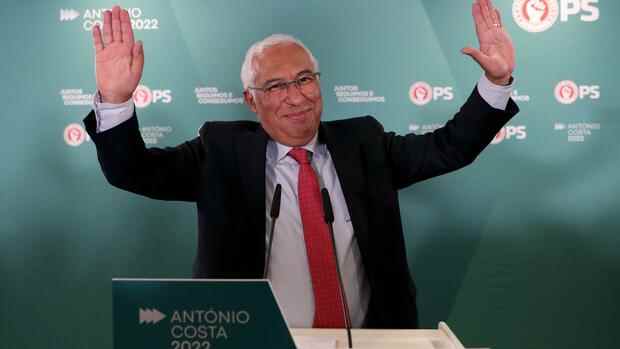The beaming winner achieved an absolute majority in the new elections in Portugal.
(Photo: action press)
Madrid When António Costa took the lectern on election night, he had to wait for his supporters’ cheers to die down. The socialist won 42 percent of the votes in the early parliamentary elections and thus an absolute majority in parliament after seats. Nevertheless, he is deliberately modest: “An absolute majority does not mean absolute power. It is an additional responsibility to govern with and for all Portuguese.”
The reason for this may be the Portuguese’s bad memories of the first and so far last absolute majority of Costa’s party PS: In 2005, José Socrates had gotten them. But he was charged with various corruption offenses during his tenure and is currently awaiting trial.
Nevertheless, the election result is a brilliant success for Costa, which once again makes him a role model for European social democracy. He created this image after taking over the government in 2015 and using his negotiating skills to keep an unlikely alliance with communists and the radical left bloc alive for six years.
In the 2019 election, he won 37 percent of the votes, making him by far the most successful social democrat in the major EU countries. An absolute majority is the dream of all parties, but it is hard to find in any other European democracy.
Top jobs of the day
Find the best jobs now and
be notified by email.
Costa warned of the conservatives’ austerity
Last October, his partners Costa refused to approve the budget because he stuck to his strict budget discipline despite the pandemic. According to the EU autumn forecast, no other country in southern Europe will have such a small deficit as Portugal this year. She expects 3.4 percent, Costa had announced 3.2 percent.
His financial discipline contrasts with his rhetoric: the trained lawyer never misses an opportunity to castigate the austerity that the troika of the European Union (EU), International Monetary Fund (IMF) and European Central Bank (ECB) imposed on Portugal after they saved the country from bankruptcy in 2011. “During the election campaign, Costa repeatedly warned that this austerity would return with a conservative government,” says political scientist Filipe Teles from the University of Aveiro. “It sounds strange, but it worked.”
Costa’s mantra in recent years has been that he has found an alternative to austerity. He ended some tough austerity measures early and cut popular taxes like those on low incomes. At the same time, he cut back on some investments and increased indirect taxes such as those on gasoline. In this way he managed to reduce unemployment, debt and the deficit. However, economists call this at least partly cosmetic and point out that Costa has benefited significantly from the strong global economy.
Nobody expected the brilliant victory
With the current election result, the former long-serving mayor of Lisbon surprised everyone again. Before the election, polls confirmed that he was in a stalemate with his conservative challenger Rui Rio. He had recently caught up so much in the surveys that he had already asked Costa to lose with decency. Rio has since offered his resignation.
The comparatively high turnout of 58 percent may have helped, in 2019 it was only 49 percent. Unlike the charismatic political professional, opposition leader Rio had not succeeded in uniting the conservative electorate to such an extent. Costa kept his word again – his declared goal for the new election was an absolute majority from the start.
More: Victory of the socialists in Portugal – You can win elections even with rigid financial policies. A comment.
